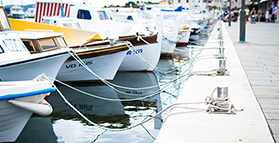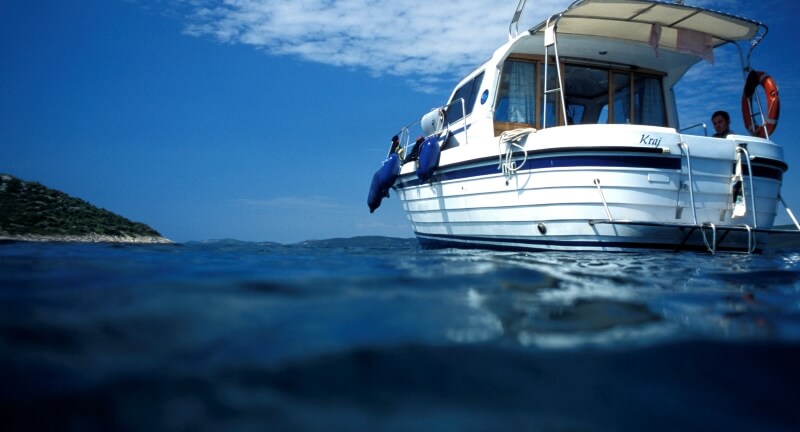There’s a good reason most retirement fantasies feature carefree adventurers aboard their very own boats – but, do you have to wait ’til then to live the dream?
Let’s break down the investment to see how you can afford a floating ticket to travel and relaxation in 2021 and beyond!
Cost to Buy a Boat
Stroll the marina and you’ll see just how many different types of boats there are – and choosing the right one for you vastly affects the cost.
Choose a cabin-free motorised fishing boat and you’ll pay about $15,000 used and up to $35,000 new.
Meanwhile, personal watercraft (jet skis) are anywhere between 3 grand second-hand and $28,000 new.
Of course, splash out on a superyacht, and you’re looking at upwards of 4 million (plus crew)!
When budgeting, consider what you’ll do on your boat, how many people will board, and where you’ll store it.
Also, think of a boat as an investment, not a cost – that way you won’t begrudge the expenses that come with ownership.
You can browse boat listings on Trade A Boat to get a better idea of the cost of buying a boat in Australia.
Maintenance Costs
After the initial outlay, keeping a boat in good nick is vital to lifespan, safety and resale value. When buying a boat, be prepared for relatively high maintenance costs.
While you’ll save on maintenance by buying new and sticking to freshwater, boats are meant to be enjoyed, so don’t limit yourself, just budget for maintenance.
Boat cleaning should cost no more than washing your car, and one of the most important steps – flushing the engine of saltwater – is free.
Meanwhile, engine maintenance costs can be kept down by being consistent.
Learn how to do minor repairs and maintenance yourself, and plan for a service centre every year, or each 100 hours on the water.
Given that, for example, boat oil changes cost less than double that of a car, boat maintenance should be about 10% of the cost of your boat every year.
Also, keep in mind that your maintenance costs will vary depending on whether you buy your boat new or used. When you buy a used boat, you will save money upfront but you will likely spend more money on maintenance in the long run.
Related Article: Should You Buy A New Or Used Boat?
Storage Costs
Hand-in-hand with maintenance, storage is another cost and depends on how and where you keep your vessel, how big it is, and where you live.



Dry storage is increasingly popular because it protects from the elements and animals and can lower insurance and maintenance costs.
Dry stack storage starts at about $400 per month uncovered, while an on-water berth at a marina runs between $100 for a remote location and $1000 for a prime Sydney spot, per month.
Of course, there’ll be periods of time when your boat ‘winterises’. While winters in Australia aren’t much to write home about, you should still set money aside for getting your boat running again come spring.
Remember, prevention beats cure – safeguard against mould, flush the engine, replace the antifreeze, and your pride and joy will hibernate happily.
Read our boat storage guide for more details on storage options for your boat and the costs associated.
Insurance Costs
Ah, insurance – the unavoidable grudge purchase.
Boat insurance costs vary depending on the size, speed, age, storage conditions and travel paths, and whether you opt for “agreed value” (value at purchase time) or “actual cash value” (cheaper upfront, lower long-term payout).
Other influencing factors include vessel type and insurance add-ons, like storm coverage, salvage, and towing.
Like all insurance, it pays to research and heed ‘real people reviews’.
Speak to those who’ve lodged a claim and go with an insurer who consistently acts fairly and quickly.
Get a marine insurance quote through Credit One.
Equipment And Accessories Costs
The best boat in the world is nothing without safety gear.
Upfront, budget for lifejackets and floatation devices, signalling devices (audio and visual), fire extinguishers, a VHF radio, anchor, and navigation tools.
Then, set aside a little money each year and look out for sales so you can continually upgrade and grow your equipment list.
Aside from tangible gear, it’s wise to factor in first aid training, license costs, and a slush fund for fishing gear!
Fuel costs
Fuel’s another essential part of boat ownership, and one dependent on a few factors.
A rough rule of thumb is to divide the total engine horsepower by 10 for gas and .06 for diesel motorboats.
A speed boat, of course, will burn more fuel than a small boat with sails. Sea conditions, wind rate and what weight you carry also matter.
One more thing – if your boat doesn’t have one, fit a fuel consumption gauge so you can budget for cost – and make it home safe.
Finance repayments
With quite a few costs to consider, it often makes sense to spread the initial cost of your boat over time.
Finance gives you greater flexibility and less up-front costs, but not all plans are created equal, and comparing all options can be overwhelming. You can calculate the cost of repayments using a boat finance payment calculator.
Credit One can save you money and make the process plain sailing by getting the best rate for your circumstances. They offer low rates on boat finance from 3.99% and you can apply online in just 60 seconds.
Get a quick quote on boat finance from Credit One.
Like all major purchases with many variables, getting the most bang for your boat means doing your homework.
Rent a few first, shop around, and join a club for insider intel.
Plan well and you’ll skip towards that sunset yet.
Related Reading
One Adventure Boat Buying Guide
12 Questions You Should Ask When Buying A Boat
How To Get A Boating License in Australia
If you’re looking to upgrade your caravan, camper, boat or 4WD, get a 30 second quick quote on finance with CreditOne – Australia’s best rated finance broker.



